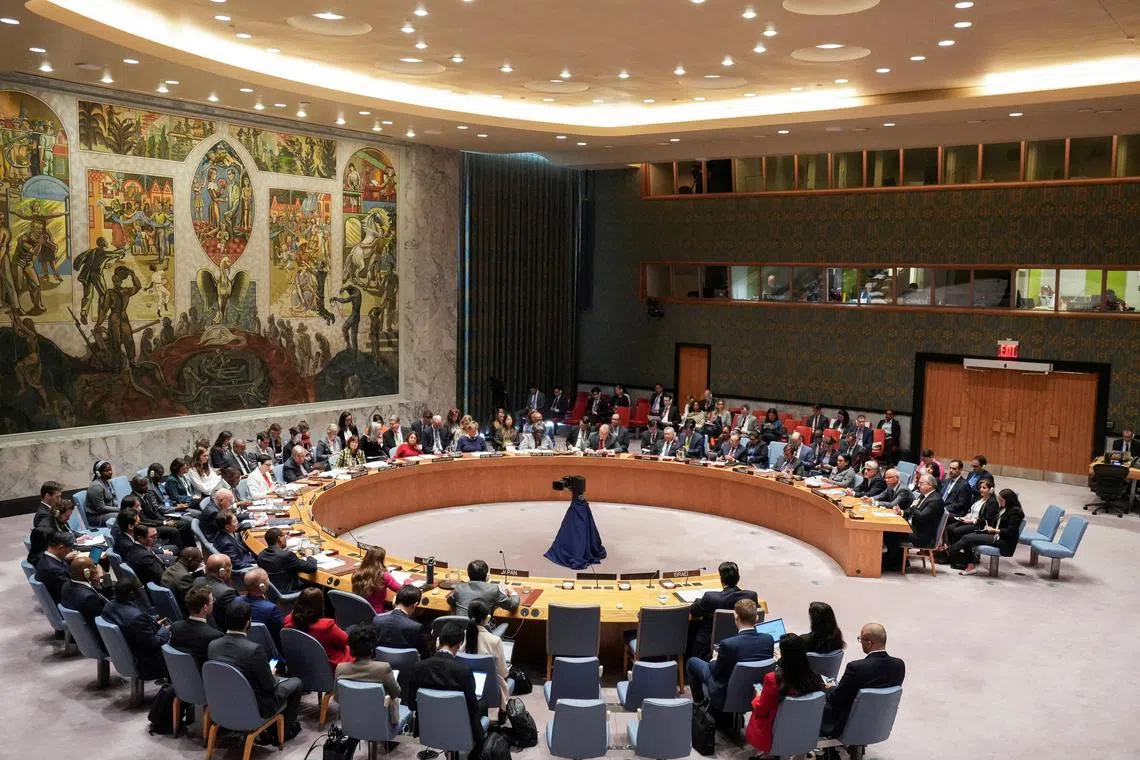At UN, Israel and Iran warn each other against attacks
Sign up now: Get ST's newsletters delivered to your inbox

The United Nations Security Council calls an emergency meeting at UN headquarters in New York City on Oct 2, following a ballistic missile attack on Israel,
PHOTO: REUTERS
Follow topic:
UNITED NATIONS - Israel, backed by the United States, and Iran on Oct 2 threatened each other with retaliation if attacked as the United Nations Security Council met amid fears of a wider war in the Middle East.
"This deadly cycle of tit-for-tat violence must stop," UN Secretary-General Antonio Guterres told the 15-member council. "Time is running out."
The council met after Israel killed the leader of Lebanon's Hezbollah and began a ground assault against the Iran-backed militant group and Iran attacked Israel in a missile strike.
"Israel will defend itself. We will act. And let me assure you, the consequences Iran will face for their actions will be far greater than they could ever have imagined," Israel's UN ambassador Danny Danon told the council.
Iran’s UN ambassador Amir Saied Iravani said the missile attack on Oct 1
"Iran is fully prepared to take further defensive measures, if necessary, to protect its legitimate interests and defend its territorial integrity and sovereignty against any acts of military aggression and the illegal use of force," he said.
US ambassador to the UN Linda Thomas-Greenfield told the council that US support for Israel had been defensive
"Let me be clear: The Iranian regime will be held responsible for its actions. And we strongly warn against Iran – or its proxies – taking actions against the United States, or further actions against Israel," she said.
French UN ambassador Nicolas de Riviere said France wants the Security Council to "show unity and to speak with one voice" to de-escalate the situation. Ms Thomas-Greenfield said the council should condemn Iran and impose "serious consequences" on Iran's elite Islamic Revolutionary Guards Corps for its actions.
Israel and the United States both called for sanctions on Iran.
‘Exceptional’ restraint
Mr Guterres told the council he strongly condemned Iran's attack on Israel. Earlier on Oct 2, Israel's foreign minister said he was barring Mr Guterres from entering the country
Russia's UN ambassador Vassily Nebenzia praised Iran for "exceptional" restraint in recent months and said the missile attack on Israel could not be "presented as though all of this happened in a vacuum, as though nothing is happening - and nothing did happen - in Lebanon and Gaza, in Syria, in Yemen".
"But it did happen, and it led to a new, very dangerous spiral of a widening Middle East conflict," Mr Nebenzia said.
A deadly Oct 7 attack on Israel by Hamas triggered the war in Gaza, where authorities say more than 41,000 people have been killed as Israel's military has levelled swaths of the enclave, driving nearly all of its 2.3 million people from their homes.
Hezbollah and the Iran-aligned Houthi group in Yemen have been firing rockets at Israel in sympathy with the Palestinians.
Over the past year, the Security Council has adopted four resolutions on the war between Israel and Hamas in Gaza, most recently in June when it backed a ceasefire proposal outlined by US President Joe Biden.
Russia's Nebenzia accused the US of "trying to pull the wool over our eyes" by pushing quiet diplomacy that is yet to produce a deal to end the war in Gaza.
"To be perfectly honest with you, we are left with the impression by all of this, that these mediated negotiations are something that Washington is conducting with itself," he said.
Ms Thomas-Greenfield said the events of the past week should send an unambiguous message to Hamas leaders.
"Hezbollah and Iran will not rescue you," she said. "The only path forward is a ceasefire agreement. We must double down on diplomatic solutions that would ensure the safety of people across the region." REUTERS

